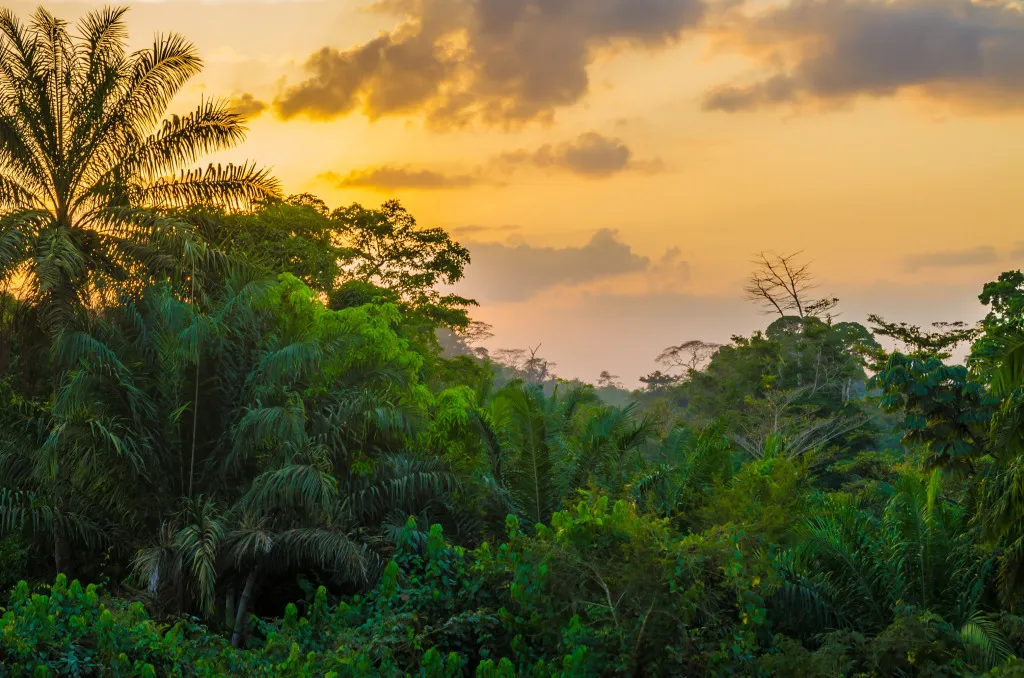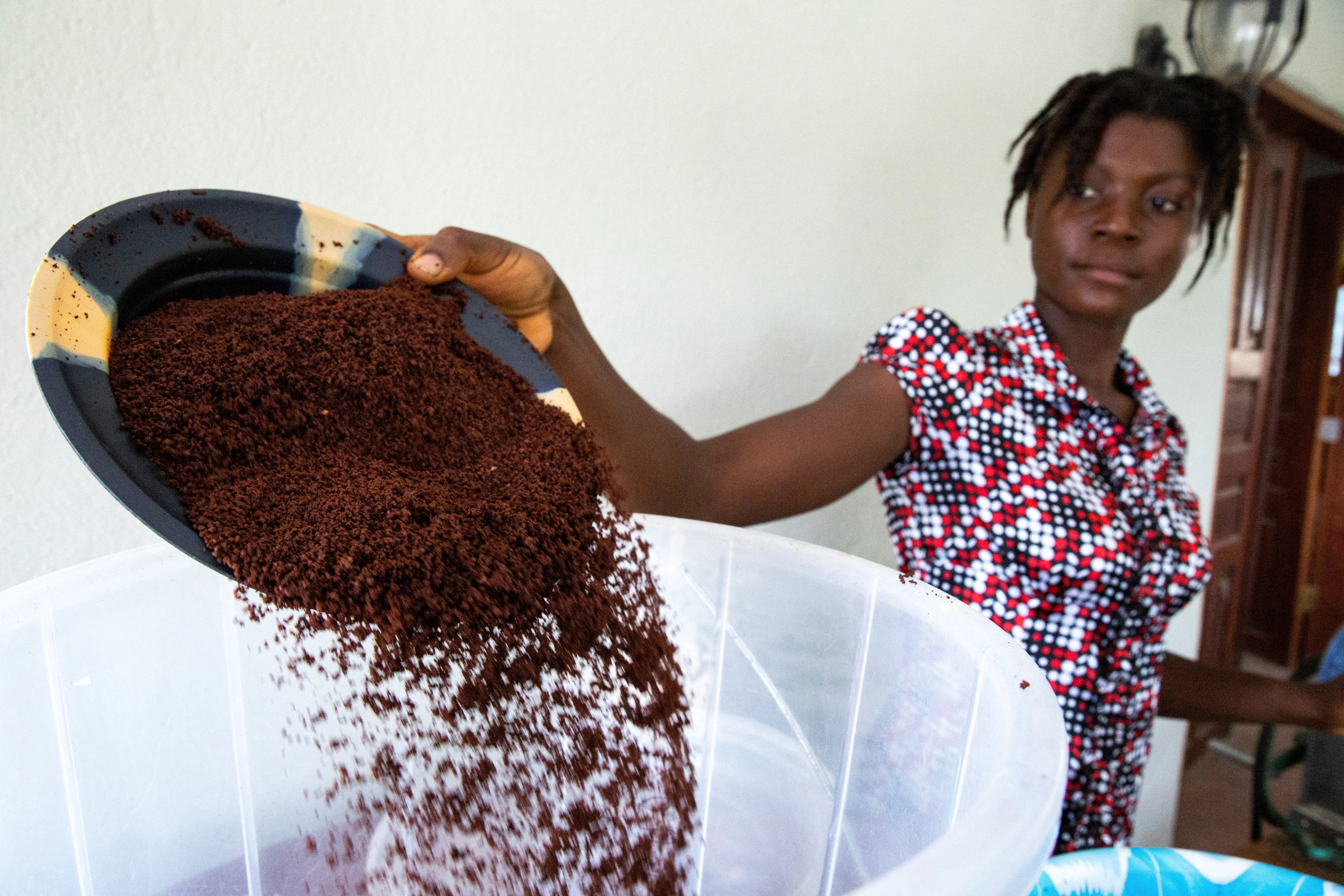The slicing and thump of pods falling from trees interrupts the stillness of a cocoa plantation in a remote part of Nimba County during harvest season. Most of the beans nestled inside the reddish pods will be sold to Monleh Enterprises, the country’s largest cocoa trader. Monleh’s CEO, Rachel Mulbah, runs a tight ship.
“Our tonnage always tops other agents selling to our local buyer,” Mulbah declares. “I never owe a partner. And now we’re chasing good quality, not just conventional cocoa.”
Liberian cocoa has a poor international reputation due to a history of inconsistent quality, leading to automatic price penalties on the global market. Almost all Liberian cocoa is sold on the bulk market for use in the cosmetics industry.
The current market conditions give Liberian farmers little incentive to improve their post-harvest practices such as fermentation and drying of the beans – critical to quality and flavour – since their efforts do not reap better prices. With negligible national volumes, Liberia has been left trailing behind neighbouring Côte d’Ivoire and Ghana, which together produce some two-thirds of the world’s cocoa. This is in spite of fertile soil and an optimal climate for growing the crop.
“Historically, Liberia has not done much to improve the value or volume of its cocoa exports,” says Robert Davis, a Liberian political economist. “Cocoa is of little commercial value, representing roughly 0.4% of GDP. Fundamental investment needs to be made from the bottom up for it to have any meaningful impact on the economy.”
A report published by the VOICE Network, which advocates reforming the cocoa sector to improve working conditions, states that the bulk cocoa market holds producers in a cycle of poverty, with less than 10% of farmers in Ghana – the world’s second largest producer – on or above the living income line. A joint attempt by Ghana and Côte d’Ivoire to set a minimum price to improve farmers’ incomes has proven unsuccessful.
Growing awareness for alternatives
While the world’s largest bulk markets of Europe and the US are becoming increasingly saturated, premium cocoa markets are stable and growing. Buyers are prepared to pay more depending on cocoa bean quality, availability and its uniqueness in terms of both physical attributes and the context in which it was grown.
Liberian traders such as Rachel Mulbah are becoming aware of these alternative markets driven by a growing appetite in Europe and North America for high-quality dark chocolate that guarantees social and environmental sustainability in its production.
Their awareness is thanks in large part to the Centre for the Promotion of Imports from Developing Countries (CBI), an agency of the Ministry of Foreign Affairs of the Netherlands, the country that is the world’s largest importer of cocoa beans.
CBI, together with GROW, a Swedish-funded investment advisory agency, is providing support to buyers to enable them to competitively trade on the European market. As well as helping to improve cocoa bean quality, CBI and GROW have made introductions to European buyers and are assisting with branding to change the image of cocoa originating from the two countries.
“The demand for better product is currently increasing by 10% per year,” says Jörn Berger, the CBI cocoa and chocolate expert leading the initiative in Liberia.
“Liberia is disconnected from information and far from the market,” he continues. “Just by sharing information we can achieve a lot.”
The Liberia Cocoa Corporation (LCC) is a case in point. The company has been purchasing cocoa from farmers to supply the bulk market since 2009.
“I didn’t know about these buyers who focus just on fine flavour, and I certainly didn’t know how to link up with them,” recalls Lu Tolbert, LCC’s CEO. “Now I know these people exist we’re going to cater to them.”
It shouldn’t be too hard. Quality concerns aside, Liberian cocoa possesses many of the characteristics that appeal to specialty buyers and set it apart from the neighbouring global giants.
“Liberian cocoa has an interesting story of social impact, and both consumers and buyers in Europe and in the US are increasingly interested in products that have this element,” says Gustavo Ferro, an international trade specialist who recently led a study commissioned by GROW of the country’s suitability for various premium market segments.
For a start, the sector’s small size assures the rarity of the Liberian brand which – providing it meets quality standards – appeals to niche, specialty chocolate makers.
The old genetic tree varieties found in Liberia further bolster its appeal: many of them pre-date the country’s civil conflict, which began in 1989. They offer unique flavours that have been lost in Ghana and Côte d’Ivoire, where older trees have been replaced with uniform hybrid varieties developed for their high productivity and resistance to disease.
Furthermore, the majority of Liberian cocoa is organic by default, because most farmers lack the access or means to purchase chemical fertiliser and pesticides. Many premium markets demand organic certified cocoa as a standard and it is anticipated that Liberia’s input-free farms will make it easier to obtain this certification.
Liberia should also be appealing to environmentally conscious consumers due to its exceptional biodiversity, playing host to almost half of the remaining Upper Guinean Forest which spans nine West African countries from Guinea to Togo.
While the expansion and intensification of cocoa farming in Côte d’Ivoire and Ghana has led to widespread deforestation, Liberia’s swathes of intact rainforest means there is potential to develop sustainable agroforestry systems to farm cocoa in smaller quantities whilst retaining forest cover.
“Liberia is able to have highly productive farmers who do not need to destroy the tropical forest,” says Berger.

What’s being done to position Liberia?
GROW and CBI are leading a drive to improve the quality of Liberian cocoa to allow the country to make use of its other selling points while ensuring that exporters comply with European standards.
“In the premium market, quality and quality consistency are crucial,” Ferro tells African Business. Joining certification schemes can help to assure foreign buyers of consistency. LCC is among a small handful of traders making arrangements to obtain organic certified status, initially for 500 farmers along with LCC’s nucleus estate.
“It won’t require too much effort for us to meet the standards of the premium market because we already have the systems in place – we just need to tweak a couple of things,” says Tolbert.
But the shift to premium is not without its challenges. Access to finance is a major issue hindering the growth of this capital-intensive market, with a dearth of social lenders and loans only issued on highly unreasonable terms.
The state of Liberia’s road network also plays against traders, with beans often getting stuck en route from farms to the port, gaining moisture and losing quality in the process.
Tolbert has considerable experience of this: “If you go off the paved road – and you have to – it’s very bad. A lot of time the roads become impassable, the truck gets stuck and you’re there for possibly weeks.”
But these challenges only add to the appeal of cocoa which successfully makes it into the factories of craft chocolatiers.
Mulbah is optimistic about the future for her farmers: “We have a vision of expanding the company to positively impact our farming communities,” she says. “We’re looking for a good market. Once we get on that market, I believe and trust that things will improve.”
Want to continue reading? Subscribe today.
You've read all your free articles for this month! Subscribe now to enjoy full access to our content.
Digital Monthly
£8.00 / month
Receive full unlimited access to our articles, opinions, podcasts and more.
Digital Yearly
£70.00 / year
Our best value offer - save £26 and gain access to all of our digital content for an entire year!
 Sign in with Google
Sign in with Google 



